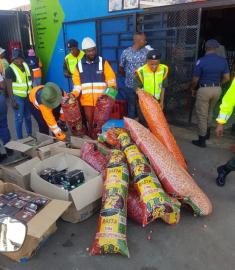
With the clock ticking for rural and township spaza owners and vendors to register their businesses, government has provided a guide for entrepreneurs on how to approach the process of applying for a traders' permit.
Last week, President Cyril Ramaphosa called for all spaza shops and food-handling facilities to register with their respective municipalities as part of decisive measures to address the recurring foodborne illnesses that have claimed the lives of at least 22 people, including children, across the country.
The interventions, the President explained, are aimed at getting hazardous pesticides off the street, protecting children from exposure to these substances, and preventing future outbreaks.
To ensure compliance, the President last Friday ordered that all spaza shops and food-handling facilities register with their respective municipalities within 21 days.
Small business owners can follow these guidelines to ensure that they are compliant with government regulations:
- Registration for trading permits for spaza shop owners and vendors is done in municipality offices or designated sites that the municipalities will communicate to residents.
- All spaza shop owners and vendors must register with their respective municipalities from 15 November to 13 December 2024.
- Application forms for registration or permits to conduct business can be accessed physically at the municipal offices or on the municipality website.
- The completed application form is to be received only by the municipal manager or a delegated official within a municipality.
- The completed permit application should contain the business owner's full name, surname, gender, and disability status.
- Other details that must be included in the application for a trading permit are:
- the identity number of the business owner;
- the physical and postal address of the business concerned;
- location where the business will be operated;
- the description of the goods or services that the business will be selling or providing to the community;
- the citizenship status of the applicants and
- the passport number, section 22 asylum seeker permit, section 24 refugee permit, and a valid visa allowing foreign nationals to be in the Republic to work or conduct business.
- The applicant must provide an affidavit stating that he/she is not engaged in the trade of illegal goods, as defined in this by-law and that his/her business will operate according to the applicable norms and standards.
- The municipality may conduct background checks on applicants, in collaboration with law enforcement agencies, to verify the legality of their business activities.
- After the application has satisfied all the conditions stated by the municipality, the business owner will be issued a registration card or permit that must be always displayed and be available for inspection.
Reporting illegal business practices
Municipalities are also expected to communicate to residents a complaints procedure that can be used by residents and community members to report illegal business practices by the business establishment
This complaints procedure will also include details about the appeals process for the application process.
According to the Immigration Act of 2002, it is a criminal offense to assist or enable an illegal foreigner to conduct any business in the Republic of South Africa.
It is also a criminal offense to assist an illegal foreigner to obtain a licence for him/her to conduct any business. - SAnews.gov.za


